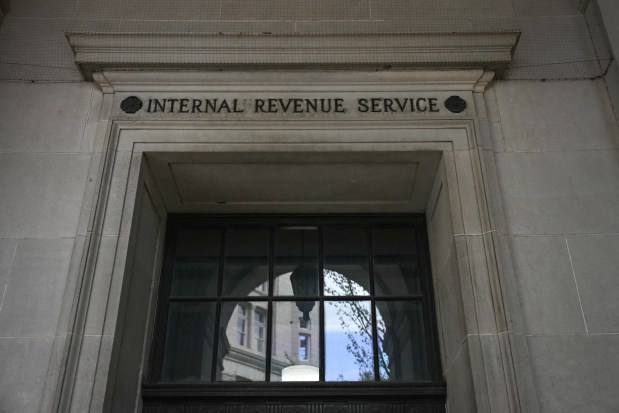For millions of Americans, filing taxes is already a frustrating, time-consuming ordeal. Now, a free online tool that promised to make the process easier is under political threat.
Last month, The Associated Press reported the Internal Revenue Service is planning to eliminate its free Direct File tax-filing program, which debuted to positive reviews in 12 states last year and had just expanded to 24 states for 2025. Illinois residents never even got a chance to try it. President Donald Trump’s “big, beautiful” tax bill includes a provision that would require the secretary of the treasury to terminate the IRS Direct File program within 30 days of the bill’s passage, Business Insider reported.
Killing the program would enable tax preparation companies to continue making fat profits off a service that was poised to become free across the country. The move also advances the Trump administration’s campaign to shrink the IRS, cutting the agency’s workforce by tens of thousands. Direct File is not the only free filing service, but all of the others typically prove hard to use. That’s why the software companies saw it as such a threat.
Why the purge? Well, no one likes paying taxes. That makes the IRS a popular target.
The agency had experienced a temporary revival under President Joe Biden. He gave federal tax collectors more resources to conduct audits, aiming to keep the system honest, especially among high-income taxpayers who can afford scorched-earth legal tactics to defend tax dodging.
Today’s GOP has attacked routine IRS enforcement as government overreach that threatens everyday families, and it is putting the agency’s very existence in jeopardy. The president has said he wants to “abolish” the agency, absurdly claiming that tariffs on foreign goods could replace the trillions of dollars collected each year from federal income taxes. (The real effect of Trump’s trade war is not trillions in new revenue, but rather inflation, damaged alliances and widespread uncertainty.)
This page supports the goal of cutting red tape and saving tax dollars, and we believe there are plenty of reasons to critique the absurdly complex U.S. tax code. But we can’t see the logic here, especially when it comes to shutting off a free tax tool. Every citizen should recognize the financial interests at stake in sidelining the IRS, as well as other federal watchdogs.
The banking and tech industries have cheered as the Trump administration gutted the Consumer Financial Protection Bureau. Since Congress launched it after the 2008 market crash, the CFPB has recovered about $20 billion in relief for bilked U.S. consumers. Similarly, the Department of Justice has pulled back from policing financial crimes, including those involving cryptocurrency, whose kingpins were among Trump’s most generous donors.
While individual tax cheats obviously benefit from a weak IRS, no stakeholder has more to gain than the large California tech giant Intuit Inc. The maker of Turbotax recently got some attention when it chipped in $1 million for Trump’s inauguration.
That amount is but a fraction of what Intuit and other tax-prep companies have spent over two decades to beat down IRS efforts to make tax filing free and instead push millions of Americans into paying for tax-prep software and services. Turbotax has greatly increased in cost over the years; many Americans now pay more than $200 for the privilege of doing their own federal and state taxes on their own computers. Back in the day, you could just fill out a paper form for free and hit the post office before midnight. But that’s no longer practical for most people.
Bear in mind that in other advanced economies, the government does the work of calculating how much tax is owed by individuals, who in some cases are merely asked to spend a few minutes verifying the numbers. In the U.S., taxpayers spend thousands upon thousands of hours and billions of dollars doing their taxes. It doesn’t have to be that way.
Since 2002, Intuit and other tax software providers have been legally required to offer a free version of their tax-prep programs. Instead, Intuit created a booby-trapped version, hidden from search engines such as Google, according to an explosive report from ProPublica.
In 2022, it looked like Intuit’s anti-IRS efforts had finally run their course. It agreed to pay out tens of millions to settle a class-action lawsuit accusing the firm of tricking taxpayers into overpaying for the “free” product. The company admitted no wrongdoing as part of the settlement.
Today, Intuit’s lobbying has staged a comeback, thanks to an administration that hates public sector tax collection as much as it does.
The Congressional Budget Office calculates that every dollar invested in IRS enforcement brings in an additional $5 or $6. Mass layoffs at the IRS are sure to result in a loss of revenue from reduced tax collection that will far outweigh any savings from lower headcount at the agency.
On a larger scale, the GOP is advancing legislation that will cut tax obligations by trillions of dollars in the years ahead. That would be fine with us if the lost revenue were balanced with commonsense spending cuts. Instead, the tax package is poised to continue a pattern of deficit spending under both Republicans and Democrats that has pushed the national debt upward of $37 trillion.
It’s unsustainable, and likely to get worse. What a ticking time bomb today’s Americans are leaving to our children.
Submit a letter, of no more than 400 words, to the editor here or email letters@chicagotribune.com.



